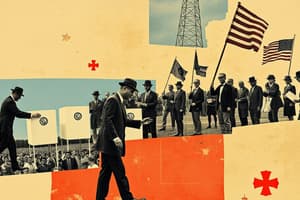Podcast
Questions and Answers
What significant change did the Twenty-Sixth Amendment bring about in 1971?
What significant change did the Twenty-Sixth Amendment bring about in 1971?
- It increased the voting age to 21.
- It established a system for electronically voting.
- It lowered the voting age to 18. (correct)
- It reformed the Electoral College system.
Which of the following is NOT mentioned as a method of political engagement?
Which of the following is NOT mentioned as a method of political engagement?
- Using online platforms like Coffee Party USA
- Joining discussion groups
- Participating in political campaigns
- Writing formal legislation (correct)
What is a concern regarding the electoral system mentioned in the document?
What is a concern regarding the electoral system mentioned in the document?
- Election fraud and fairness of electoral processes (correct)
- Limited access to voting locations
- The increasing age of voters
- Declining voter enthusiasm
Which organization advocates for a popular vote-based presidential election system?
Which organization advocates for a popular vote-based presidential election system?
How do younger citizens typically view community-based volunteer work?
How do younger citizens typically view community-based volunteer work?
Which of the following activities is considered an individual method of political engagement?
Which of the following activities is considered an individual method of political engagement?
What is emphasized as a key aspect of civic participation in the document?
What is emphasized as a key aspect of civic participation in the document?
What type of activities do young citizens prioritize according to the content?
What type of activities do young citizens prioritize according to the content?
Flashcards
Twenty-Sixth Amendment
Twenty-Sixth Amendment
A change made to the US Constitution that lowered the voting age from 21 to 18.
Interest Groups
Interest Groups
Groups that aim to influence government policy on specific issues, such as environmental protection or social justice.
Electoral College
Electoral College
A system of selecting the President based on the Electoral College, where each state's number of electoral votes is determined by the total number of its senators and representatives in Congress.
Popular Vote
Popular Vote
Signup and view all the flashcards
Collective Engagement
Collective Engagement
Signup and view all the flashcards
Community Engagement
Community Engagement
Signup and view all the flashcards
Individual Activities
Individual Activities
Signup and view all the flashcards
Suffrage
Suffrage
Signup and view all the flashcards
Study Notes
Voting Rights and Age
- Citizens can vote at age 18, due to the Twenty-Sixth Amendment, which lowered the voting age from 21 to 18 in 1971.
- This change in voting age came in response to the Vietnam War, when many young people argued that it was unfair to deny 18-year-olds the right to vote for the people who would send them to war.
Civic Engagement
- Voting is not the only way to engage in civic affairs.
- Many ways exist to participate in government and community affairs, these include joining interest groups, organizing or supporting political activism.
- Volunteering for organizations is another form of civic engagement. This may be a short-term commitment, long-term membership, or participating in activities specific to particular concerns.
Common Cause
- A non-partisan organization advocating for government accountability.
- It seeks reforms in campaign finance and verification of votes to enhance elections' reliability and prevent fraud.
- It advocates for replacing the Electoral College with a popular vote system for presidential elections.
Pluralist View
- The pluralist perspective asserts that ordinary citizens have ample opportunities for political involvement.
- This includes participating in city council subcommittees and local civic organizations.
- Civic organizations are frequently in need of volunteers.
Other Forms of Engagement
- Younger Americans today, express concern for their communities but may not participate in traditional political activism.
- Volunteering and community-based activities can contribute to civic engagement.
- Being involved in the community is an important form of civic engagement.
Studying That Suits You
Use AI to generate personalized quizzes and flashcards to suit your learning preferences.




